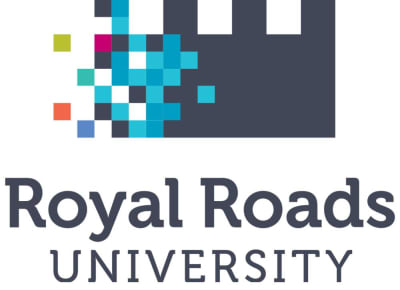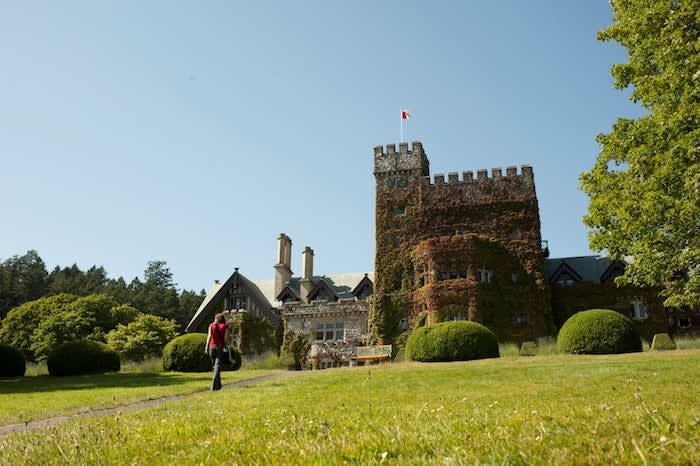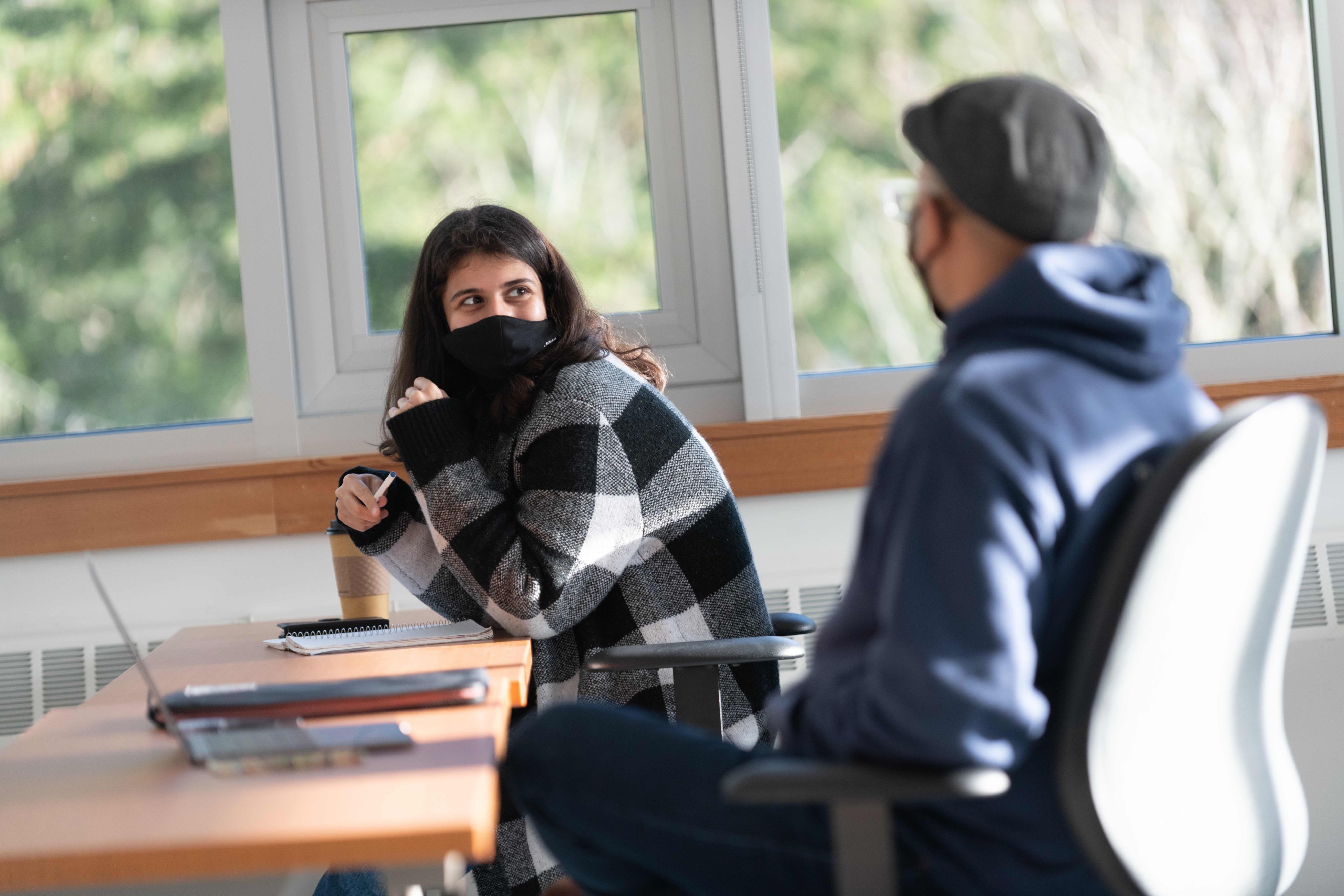
Master of Arts in Environmental Education and Communication
Royal Roads University

Key Information
Campus location
Victoria, Canada
Languages
English
Study format
Blended
Duration
2 years
Pace
Part time
Tuition fees
CAD 35,900 *
Application deadline
Request info
Earliest start date
Request info
* tuition costs are for the entire program: $35,900 international students, $28,228 domestic students
Introduction

Are you ready to cultivate your own particular mastery at this watershed moment in human history? Are you ready to contribute to a more humane and habitable existence for all and lead from the ground up?
Designed with the earth in mind, the Master of Arts in Environmental Education and Communication features a comprehensive curriculum with each course building upon the other to help integrate what you know with what you learn here so that meaning and purpose can better align with action in your life and work. Here, you will learn the skills, knowledge and tools of sustainability.
This program effectively interrupts the ‘business as usual’ conversation, cultivates awareness and insight as to how we live, work, teach & learn, how we relate to and communicate with each other, and how we might act to inspire change through education and communication.
You can choose to complete the Master's program, opt for a one-year graduate diploma or a 5-month graduate certificate. Connect with an Advisor to explore how the program can fit with your work, and life.
Program Description
This 2-year graduate program is delivered in a richly blended model of both online and face-to-face learning with the distinct benefit of three short on-campus residencies. Education of personal significance, you’ll study with masterful faculty to explore: creativity, beauty, despair & grief, systems thinking, change-making, diverse worldviews, ecological identity, communication & learning theory, and critically applied research methods. In each course in this program, you'll have the chance to experience profound mentorship and peer-to-peer learning in and outside of class where important knowledge can accrue at a new, integral, and critical edge.
The Master of Arts in Environmental Education and Communication students critically examine the issues and perceptions of our world through various lenses, perspectives and multiple modalities revealing more of the interdependencies and correspondences that exist within the larger context rather than focus on what may be erroneously identified as “the problem”. And by the larger context, that means students often get outside – outside-boxed-in mindsets and outside the classroom as well.
Who it’s for
Typically, you are a professional with a bachelor’s degree and at least two years' experience working or with significant interest in environmental education and communication. If you do not have the formal academic education to qualify for admission you may be assessed on the basis of both your formal education and your informal learning, in accordance with the Flexible Admission Process.
You are interested in:
- Engaging with individuals, organizations, communities, and nations to collaborate on what it means to educate and communicate across all sectors of society as an agent of change
- Widening your perspective, applying multiple lenses and time enough to look ‘into’ rather than merely ‘at’ the intersections between the human and more-than-human world
- Deepening your understanding of what is essential to a skilled environmental educator and communicator becoming a true citizen of the world
- Exploring divergent ways to understand the underlying and root causes of our destructive human behaviors and practices in order to be responsive and effective in leading systemic change from the classroom to the pressroom and in all places in between
- Facilitating a wide range of learning and engagement formats, relevant current technologies and media
- Evaluating the status of public information and prior knowledge concerning environmental values, issues, and opportunities
- Learning about and connecting with those making innovative contributions and leading in the field at this time
- Developing a systems-thinking approach as to how we might live, work, and learn in a more connected, compassionate, and healthy world
- Researching what you are passionate about and what the world needs more of
Upon completion, you'll be ready to take your career further in national and international levels in sectors such as education, journalism & communications, health, parks & recreation, theology, government, social profit & social mobilization, politics & governance, green technology, international NGO’s, resource management and sustainable community development, to name a few.
Program features
Three 3-weeks outstanding residencies over the summers:
- The first residency: Builds the cornerstone foundations for the program as you meet your cohort and the community that supports this program
- Second residency: One week at Field School living and learning in community with various Indigenous coastal peoples followed by a two-week on-campus immersion
- Third residency: Implementation of your thesis or major research project into action by living your learning
This program can be completed in one of two ways as a capstone to your degree:
- Thesis
- Major Research Project
Field School
A highlight of the MA in Environmental Education and Communication program is the 1-week field school where you immerse in the experience of Indigenous ways of being and knowing and learn in nature. Situated in traditional coastal territories within various Indigenous communities, you will study biodiversity and adaptation within a “living laboratory”. Guest lecturers and Elders from the communities bring and share their knowledge in-situ, allowing you to explore ecological principles that govern ecosystem dynamics and sustainability alongside Indigenous customs, heritage, and lands. Locations may vary from year to year. A moderate level of physicality is required for full participation.
In 2020, the Field School will take place on Salt Spring Island (just a thirty-minute ferry ride off the Saanich peninsula from Swartz Bay), which has a unique legal framework under the Island Trust Act that limits development and encourages the preservation and protection of the islands and its cultures. You will look at cultural and ecological restoration projects at Xwaaqw’um and also have a chance to explore the islanders' approach to managing their forests and Garry oak ecosystems for climate change. The intersection between cultural survival and ecological survival and how to ensure both is the focus of the field school.
Living Our Learning
A synthesis of all you have learned in the Masters in Environmental Education and Communication is a course entitled, Implementation to Action: Living our Learning and makes up the entire final 2-weeks of residency. This required course provides a unique opportunity to integrate the important learning that has occurred during the program. Designed to deepen self-awareness, nurture individual and collective action, optimize opportunities for peer exchange, this course encourages reflection on the pillars of life-long learning.
Admission Requirements
Standard Admission
- Four-year (or comparable) undergraduate degree in a related field, with a minimum GPA of 'B' (3.00/4.33), from a recognized post-secondary institution.
- At least two years of relevant work or volunteer experience.
- Applicants who meet the degree requirement, but not the GPA requirement, will normally be required to complete "Academic Writing and Critical Thinking" several weeks prior to starting the program and obtain a minimum final grade of B (73%).
Flexible Admission
Applicants who do not meet the Standard Admission requirements will be considered for Flexible Admission and assessed as follows:
- Normally, six years of relevant work experience, or an equivalent combination of education and experience.
- All flexible admission applicants will normally be required to complete "Academic Writing and Critical Thinking" several weeks prior to starting the program and obtain a minimum final grade of B (73%).

English Language Proficiency
If English is not your primary language, please review our English Language Requirements.
Additional Recommendations
- Our program is designed to be of benefit for a wide range of education and communication practitioners, especially those who have an interest in or a responsibility for leadership in the context of sustainability. As such, work and volunteer experience are key requirements of admission to the program.
- Indication of the potential thesis topic and thesis sponsor is beneficial to a candidate’s application.
Careers
The Master of Arts in Environmental Education and Communication at Royal Roads University will prepare you for a career that requires the knowledge, skills, competencies and applied approaches to find viable solutions to 21st-century challenges. Our graduates are working at national and international levels in sectors such as education, journalism & communications, health, parks & recreation, theology, government, social profit & social mobilization, politics & governance, green technology, international NGO’s, resource management and sustainable community development, to name a few.
Here are some recent examples of theses and opportunities resulting from graduation:
- Academia promoting ECE through meaningful outdoor education experiences
- Wilderness Rites of Passage Guide for Young Women and Girls
- Nature School founder and teacher
- Parks Canada coordinator for EE programs in the north – Thesis on analyzing the new BC curriculum in flexible studies program
- Inuvialutun language advocacy with implications for climate change
- Psychological maturation through nature-based practices
- Connecting midlife transitions to waste management using art
- Green cleaning strategies for hospitals for healthcare staff
- Mapping place attachment for enhanced bioregionalism
- Reflecting on the influence of place for an EE teacher
- Transformative learning in adolescents through EE field school
- Safety implications on daily avalanche bulletins for snowmobilers
- Critical analysis of BC’s new science curriculum
Courses
- ITAI: Introduction to Academic Integrity
- EECO500: Developing Environmental Understandings
- EECO503: Foundations for Environmental Communication
- EECO504: Systems Perspectives
- EECO508: Learning Theory and Program Design
- EECO509: Ecopsychology: At the Intersection of Theory and Practice
- EECO510: Worldviews, Ethics, and the Environment
- EECO586: The Biosphere and Sustainability
- INDS535: Outdoor Experiential Education
- EECO620: Approaches to Research in Environmental Education and Communication
- EECO688: Implementation of EEC: Living Our Learning
- EECO690: Thesis
- EECO695: Major Research Project
Financial Aid & Awards
The Financial Aid & Awards team is here to provide information and support on a variety of funding sources and award opportunities, starting with a video that introduces the comprehensive details you’ll find on this website and in our blog.
View a summary of government assistance programs for those affected by the COVID-19 crisis.
Financial planning is a crucial component of early educational planning. Please review funding opportunities well before your program begins to help build a reasonable budget.
Loans
Explore the various types of loans available to help fund your studies.
Awards
Explore a variety of competitively awarded scholarships, awards, and bursaries available from RRU and other funding agencies.
Research Scholarships
RRU manages the scholarship administration for select funding agencies. These are some of the more substantial awards.
Other Funding
Discover alternate funding opportunities like Highbred Points.
English Language Requirements
Certify your English proficiency with the Duolingo English Test! The DET is a convenient, fast, and affordable online English test accepted by over 4,000 universities (like this one) around the world.